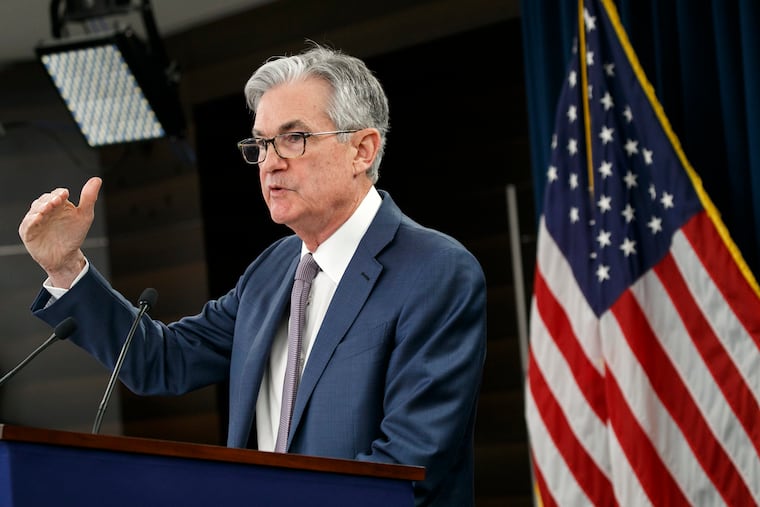Fed’s Jay Powell creating ’zombie’ firms, says noted Fed watcher
Fed watcher Danielle DiMartino Booth says low rates punish savers, widen income inequality, and thwarts the innovation of capitalism.

Is the Federal Reserve’s lower-for-longer interest rate policy worsening the income divide and benefiting Wall Street, not Main Street? Is it actually thwarting innovation in the markets?
Yes, concludes Danielle DiMartino Booth, CEO and chief strategist for Quill Intelligence, a research and analytics firm and newsletter publisher. Before starting her own firm, DiMartino Booth spent nine years at the Federal Reserve Bank of Dallas, where she served as adviser to Fed president Richard W. Fisher throughout the 2008 financial crisis. She’s the author of Fed Up: An Insider’s Take on Why the Federal Reserve Is Bad for America (Portfolio).
Under current Fed Chair Jerome Powell, “effectively the Fed wants cover for running loose monetary policy longer than ever,” she said in an interview.
DiMartino Booth is critical of today’s “easy” monetary policy, although she notes that it’s difficult to be a dissenter, particularly among Fed governors.
The Federal Reserve cut interest rates to goose the U.S. economy out of the Great Depression and kept rates low well into World War II. When inflation did finally pick up, it was in part due to America gearing up military manufacturing.
She’s critical of today’s Fed similar policy of low rates for as long as it takes, and Powell’s new, more relaxed inflation limits. The Fed last week said it may allow inflation to shoot past its 2% annual target, and wouldn’t raise rates just to ward off the theoretical threat of inflation posed by a strong job market.
“They’re looking to rewrite history, to keep monetary policy as low as it’s been in a century,” she said. “I’m not a fan of such a policy. It’s irresponsible. They’re doing it under the auspices of helping the middle class. But there’s no such thing as trickle down to Main Street. They’re punishing savers.”
The U.S. central bank is now an active buyer in the bond market and is acting as an unnatural backstop for failing companies, she added. Since May, the Fed has purchased about $8.7 billion of exchange-traded funds focused on investment-grade and high-yield bonds. Starting in mid-June, it also bought $3.6 billion of mostly investment-grade corporate bonds, according to the Wall Street Journal.
“Even if a bond is downgraded, it still qualifies for the Fed’s purchase program. This was a back-door backstop of the junk bond market. Implicitly, the market had gotten way ahead of itself and couldn’t afford the huge losses sustained by investors.”
“The optics are so damning,” she added. “The Fed has placed itself in between the financial markets and the process of capitalism. In capitalist framework, there’s Chapter 11 filings and corporate reorganizations. Now, the Fed steps in, and forces the market to continue funding these companies.”
Instead of permitting winners and losers to emerge, the Fed “creates a zombie [company] today, robbing growth from tomorrow. Once a recovery returns, the economy expands, there’s not enough room for new entrants, and the deadwood was allowed to survive,” she said.
She highlights Las Vegas casino operators. Barring the Fed’s super-low interest rate policy, “they would have otherwise restructured. Their bread and butter business of conventions has been eviscerated, because of the patchwork response to the virus. Vegas doesn’t function as a business model unless folks are packed in close together, everything the virus [forbids]. Yet casinos are in business and piling on more debt.”
The upshot: instead of bankruptcy, companies take on more debt than they can handle.
Rather than permitting “restructuring and keeping some jobs,” DiMartino Booth said, the Fed has effectively backstopped a market that should have had its house cleaned.
This isn’t the first time the Fed has expanded beyond its stable currency and full employment mandates. The “Fed put” option was born under former Chairman Alan Greenspan in 1987. That unwritten policy is that the Fed insures the stock market from collapse, as it did in 2008.
That wasn’t the case for the bond market until now, she said.
“At least there was price discovery in the corporate bond market. The Fed’s removed that. Personally, I don’t own corporate bonds,” DiMartino-Booth said. Instead, she buys municipal bonds.
“I own them because fixed-income investors have thrown out the baby with the bathwater. There are a lot of well-run states in this country that have pensions funded, they have a well-run, balanced budget, and great cover for the bonds,” she said, citing Midwestern states with no fiscal deficit.
What about inflation?
If the U.S. government continues to print money under President Donald Trump or a Democratic president, “there’s no cap on deficit spending until June 2021. The Fed allows the government to spend and only worry about interest expense instead of paying back principal.” Economist Jim Grant “said it best: The Fed is both arsonist and firefighter.”
The current inferno: a U.S. stock market reaching new highs and valuations not seen since 1929 and 2000. That was true at least until Thursday and Friday of last week when stocks fell sharply.
She’s not convinced the Fed’s higher inflation target will actually work.
“If companies don’t have pricing power, they can’t pass on higher prices to consumers. Just take a look at rents, which are coming down in many cities because people can’t afford them.”
David Kotok, co-founder of Cumberland Advisors, a fixed-income investment firm in Sarasota, Fla., knows DiMartino Booth and admires her “sharp, centrist” views. However, “It’s always easier to criticize the Fed with a retroactive view,” he said.
He’s not as concerned about the Fed’s exploding balance sheet.
“My view is that the CARES Act should be many more trillions of dollars,” Kotok said. “We need the equivalent of a Marshall Plan” for the United States, similar to the rescue plan for Europe after World War II.